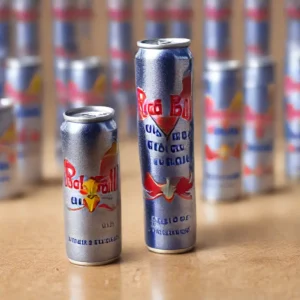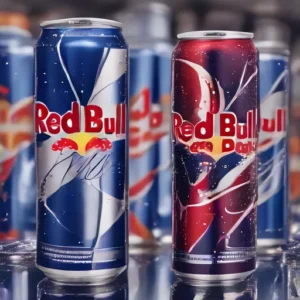As someone who enjoys staying energetic and focused, I understand the temptation to reach for a can of Red Bull daily. However, drinking Red Bull every day can have several side effects that you might not be aware of. Let’s explore these side effects.
What is Red Bull?

Red Bull is one of the most popular energy drinks in the world. It contains caffeine, taurine, B vitamins, sugar (or artificial sweeteners in the sugar-free version), and other ingredients aimed at boosting energy and alertness.
Side Effects of Drinking Red Bull Every Day

Drinking Red Bull every day can lead to several side effects. Here’s a detailed look at each one, with factual information to help you understand the potential risks. Also explore the side effects of energy drinks.
1. Anxiety
As someone who might drink Red Bull daily, you could experience increased anxiety. Red Bull contains caffeine, which is a stimulant. High caffeine intake can cause your nervous system to be overly stimulated, leading to feelings of anxiety and restlessness.
Studies have shown that consuming more than 400 mg of caffeine per day can heighten anxiety levels. Since one 8.4-ounce can of Red Bull contains about 80 mg of caffeine, having multiple cans a day can easily push you over the recommended limit.
2. Dehydration
Caffeine is a diuretic, which means it increases urine production. If you drink Red Bull every day, you might find yourself urinating more frequently, which can lead to dehydration if you’re not drinking enough water to compensate.
Dehydration can cause symptoms like dry mouth, dizziness, and headache. Staying hydrated is crucial, so it’s important to balance your caffeine intake with plenty of water.
3. Insomnia
Regularly consuming Red Bull, especially later in the day, can disrupt your sleep patterns. The caffeine in Red Bull can stay in your system for several hours, making it difficult to fall asleep or stay asleep.
This can lead to chronic sleep deprivation, which affects your overall health, mood, and cognitive function. If you’re having trouble sleeping, it might be worth considering reducing your Red Bull intake or avoiding it altogether in the afternoon and evening.
4. Headaches
Frequent consumption of Red Bull can also lead to headaches. This is due to the caffeine content, which can cause what’s known as a caffeine rebound headache. When the effects of caffeine wear off, you might experience withdrawal symptoms, including headaches.
Consistent high caffeine intake can also lead to chronic daily headaches. If you notice you’re getting headaches often, it might be time to cut back on Red Bull and monitor your caffeine consumption from all sources.
5. Increased Blood Pressure
Drinking Red Bull every day can raise your blood pressure. Caffeine and other stimulants in Red Bull cause temporary spikes in blood pressure. For people with pre-existing high blood pressure or heart conditions, this can be particularly dangerous.
A study found that consuming energy drinks like Red Bull can significantly increase blood pressure and heart rate. Monitoring your blood pressure regularly if you consume Red Bull is a good practice. Also explore the side effects of energy drinks on brain.
6. Irregular Heartbeat
The stimulants in Red Bull can cause your heart to beat faster and may lead to irregular heart rhythms, especially if consumed in large amounts. For individuals with underlying heart conditions, this could increase the risk of more serious cardiac events.
The taurine and caffeine combination in Red Bull is particularly potent, potentially leading to palpitations or arrhythmias. Consulting a doctor if you experience irregular heartbeats after drinking Red Bull is advisable.
7. Stomach Upset
Red Bull’s high acidity and caffeine content can irritate your stomach lining, leading to discomfort, nausea, and even gastritis in severe cases.
If you find yourself experiencing frequent stomach aches, cramps, or acid reflux, it could be related to your daily Red Bull intake. To mitigate this, try reducing your consumption and consider other dietary adjustments to support your digestive health.
8. Diarrhea
High caffeine intake can speed up the digestive process, leading to diarrhea. Drinking Red Bull every day increases your risk of gastrointestinal disturbances. Diarrhea can lead to dehydration and nutrient deficiencies if it occurs frequently.
If you’re experiencing digestive issues, cutting back on Red Bull and monitoring your overall caffeine intake can help stabilize your digestion.
9. Weight Gain
Red Bull is high in sugar, with one can containing about 27 grams of sugar. Consuming it daily adds a significant amount of extra calories to your diet, which can lead to weight gain over time.
The sugar in Red Bull provides empty calories, which means they don’t contribute to your nutritional needs. Reducing your intake or opting for sugar-free versions could help manage your weight more effectively.
10. Tooth Decay
The sugar and acidity in Red Bull can be harmful to your teeth. Regular consumption can erode enamel and lead to cavities and other dental issues. Sugar feeds harmful bacteria in the mouth, which produce acid that damages teeth.
To protect your dental health, it’s important to maintain good oral hygiene and limit your intake of sugary drinks like Red Bull. Also explore the side effects of energy drinks on stomach.
11. Vitamin Deficiencies
While Red Bull contains some vitamins, its frequent consumption can still lead to deficiencies. The high sugar content can interfere with the absorption of essential nutrients.
Additionally, relying on Red Bull for energy might lead you to neglect a balanced diet. Ensuring you get a variety of nutrients from whole foods is essential for maintaining overall health.
12. Addiction
Caffeine is addictive, and regular consumption of Red Bull can lead to dependency. You might find yourself needing to drink it to avoid withdrawal symptoms like headaches, fatigue, or irritability.
Addiction to caffeine can disrupt your daily routine and overall well-being. Gradually reducing your intake can help manage dependency and improve your health.
13. Jitters
The high caffeine content in Red Bull can cause jitters, making you feel shaky or nervous. This can affect your ability to focus and perform daily tasks efficiently.
If you’re feeling jittery after drinking Red Bull, it’s a sign you’re consuming too much caffeine. Cutting back can help you feel more stable and calm.
14. Fatigue (Crash after the high wears off)
After the initial energy boost from Red Bull wears off, you might experience a crash, feeling more tired than before. This cycle of high and crash can be exhausting and disrupt your natural energy levels.
Managing your caffeine intake and finding more sustainable ways to boost your energy, like regular exercise and a healthy diet, can be more beneficial in the long run.
15. Increased Risk of Heart Disease
Long-term daily consumption of Red Bull can increase your risk of developing heart disease. The high levels of sugar, caffeine, and other stimulants can have a cumulative negative effect on your cardiovascular system.
Studies have linked the frequent intake of energy drinks to increased risks of heart problems, including hypertension and cardiac events. Being mindful of your heart health and moderating your consumption can help mitigate these risks.
Conclusion:
While Red Bull can provide a temporary energy boost, its daily consumption can lead to numerous health issues. Balancing your intake with healthy habits and monitoring your body’s response is crucial for maintaining your overall well-being.

